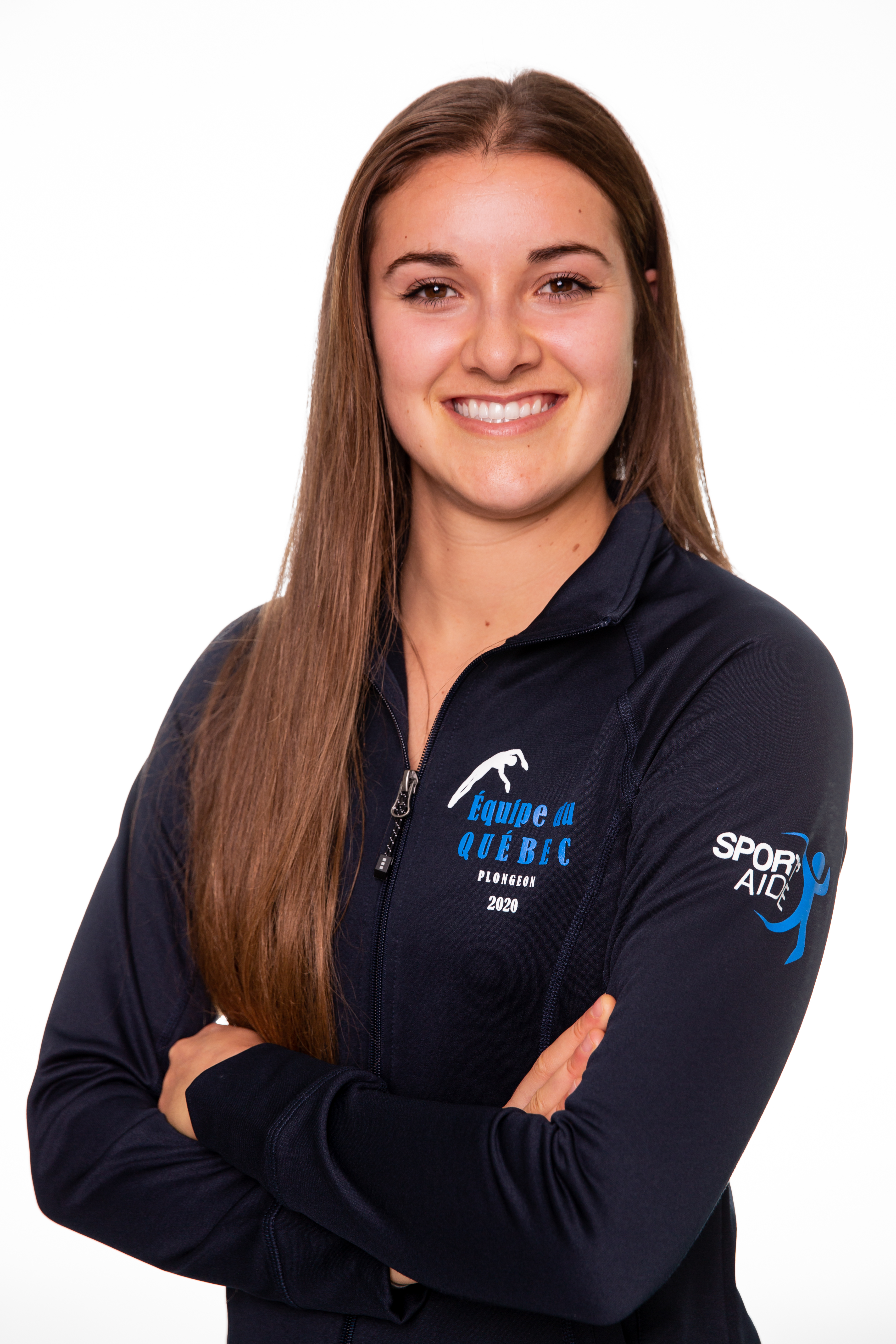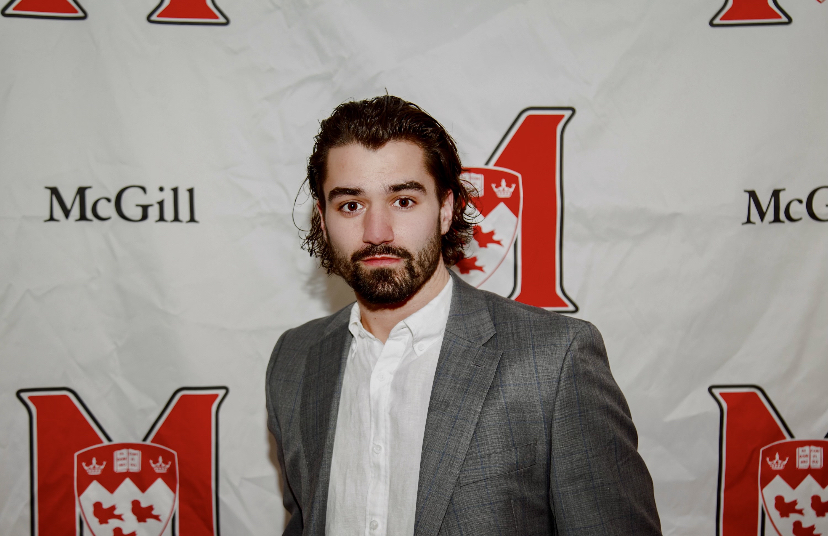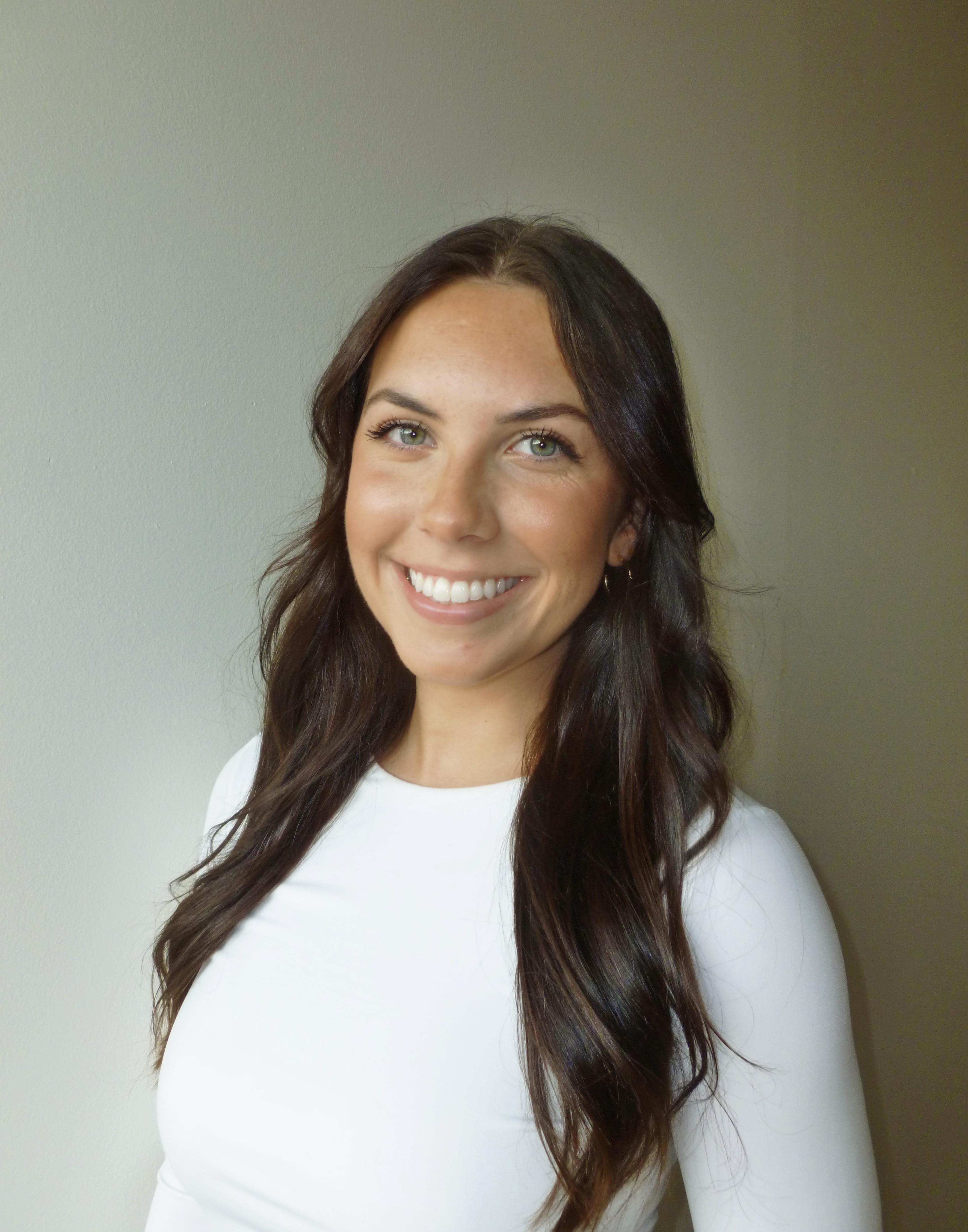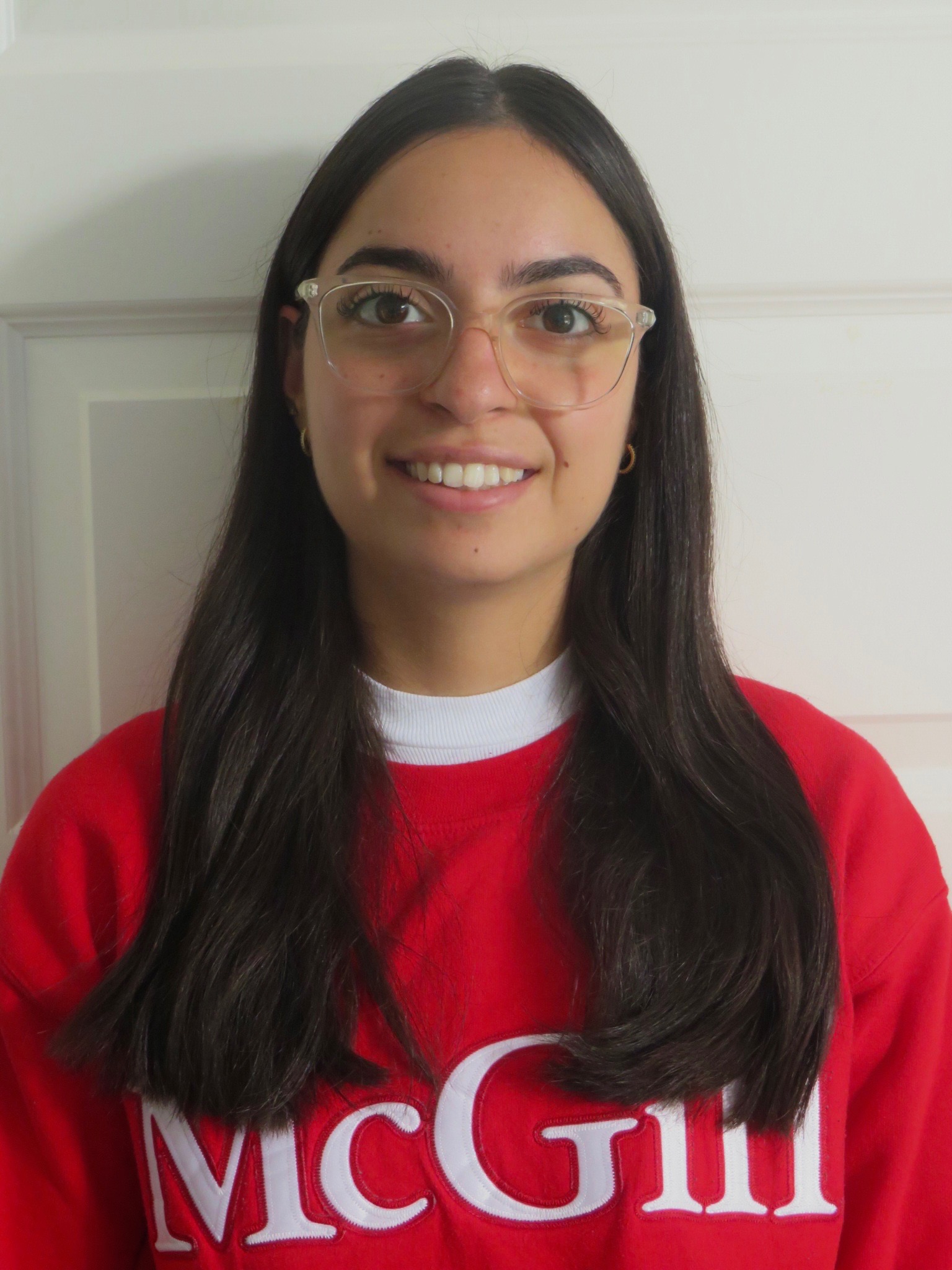- Siobhan Henderson
- Marc Glaude
- Christopher Cinelli-Faia
- Hugh Clarke
- Adam Pilotte
- Rachael Manning
- Claudia Zeppetelli
Siobhan Henderson (PhD4)
 Hometown:
Hometown:
Saint-Hubert, Quebec
Degrees:
- BSc in Kinesiology, McGill University
- MA in Kinesiology and Physical Education, Specialization in Sport Psychology, McGill University
Current Degree:
- PhD (in progress) Sport Psychology, McGill University
Funding:
- Bloom, G. A., & Henderson, S. Evaluation of the Talk Today program delivered in a hybrid format to elite adolescent male hockey players and their support staff. Funded by the Mitacs Accelerate Program and Canadian Mental Health Association (Ontario), 2023–2024.
- Recipient of the Dan Q. Marisi Award in the Department of Kinesiology & Physical Education at McGill University, 2023.
- Recipient of the Fonds de Recherche du Québec - Société et Culture (FRQSC) Doctoral Scholarship, 2022–2026.
- Recipient of the Social Sciences and Humanities Research Council (SSHRC) Joseph Armand Bombardier Canada Graduate Scholarship – Master’s, 2019.
- Recipient of the Graduate Excellence Award in the Department of Kinesiology and Physical Education at McGill University, 2018, 2020.
- Recipient of the Cooke Fellowship in the Department of Kinesiology and Physical Education at McGill University, 2018.
Research Interests:
The research for my master’s degree explored the desired coaching behaviours during competitions of six Canadian national team springboard and platform divers. Among our findings, athletes perceived their coaches to play a crucial role in facilitating their performance during competition, which included helping them to direct their attention, prevent doubt from settling in, and manage their emotions. However, athletes discussed certain emotions and behaviours of the coach that negatively affected their mood and performance. Consequently, the nature of high-performance coaching requires individuals who can manage various challenging situations with their athletes and their collective team, while ensuring that their own emotional and psychological states are at optimal levels to operate effectively under these numerous pressures. Some of these demands include job insecurity, long hours, high workload, traveling, media pressure, team performance, and player satisfaction. Collectively, this can affect an athlete’s performance and a coach’s mental health. To date, the majority of research on mental health and well-being in elite sport has focused on athletes. The lack of research on the mental health of elite coaches is surprising given that several international consensus statements have identified the important role of coaches in safeguarding the mental health of their athletes (Breslin et al., 2019; Moesch et al., 2018; Reardon et al., 2019; Van Slingerland et al., 2019). The closest line of research is coach burnout, which has found that coaches can experience burnout and exhaustion as a result of various stressors that make up their job. Additionally, coaches have historically suppressed the symptoms of burnout to avoid being perceived as vulnerable or weak in the elite sport context. Given their reluctance to disclose and seek help for experiencing psychological distress, it seems reasonable that similar thoughts and behaviours may exist with regard to their own mental health issues. Therefore, the focus of my doctoral research is to gain a better understanding of mental health in elite sport from the perspective of the coach and to provide recommendations to better support them in this high-pressure environment. We hope this program of research will contribute to helping coaches cope with the demands of their profession to ensure their own mental health and well-being.
About me:
My interest in sport psychology stemmed from my background in competitive sport as a national level springboard diver and my experience as a youth sport coach. In particular, the coaches that I have had over the course of my athletic career have been instrumental in my development and diving success. As a result, I have been the recipient of the “Trophée Philippe Comptois” awarded by Diving Québec to an athlete who demonstrated perseverance and tenacity in the face of adversity as well as the “Ripple Effect Athlete Award” by Diving Canada, which is given to an athlete who is a positive role model and whose actions, ideals and values have impacted others in a positive way. My background in diving and coaching led me to become increasingly interested in the coach’s role in facilitating successful performances in sport. For these reasons, I decided to pursue a doctoral degree in sport psychology, specializing in high-performance coaching, to further understand what it takes for coaches to be at their best in a demanding environment, subsequently allowing them to optimize athlete development and performance.
Publications:
Henderson, S., Alexander, D., Bloom, G. A., & Jowett, S. (in press). The coach-athlete relationship in high-performance sport: A behavioural perspective. In. V. Girginov (Ed.), Routledge resources online sports studies. Routledge.
Lefebvre, J. S., Henderson, S., Salomie, A., Heath, N. L., & Bloom, G. A. (2023). A mixed-methods examination of a mental health awareness program in elite ice hockey. International Journal of Sport & Exercise Psychology, 21(3), 557–578. ![]() Preview
Preview
Henderson, S., Bloom, G.A., & Alexander, D. (2022). Desired coaching behaviours of elite divers during competition. International Journal of Sport & Exercise Psychology, 20 (6), 1777-1794. ![]() Preview
Preview
Marc Glaude (PhD1)
Hometown:
Montreal, Quebec
Degrees:
- BSc in Physical and Health Education, Université de Montréal
- MA in Kinesiology and Physical Education, Specialization in Sport Psychology, McGill University
Current Degree:
- PhD (in progress) Sport Psychology, McGill University
Research Interests:
My master’s thesis research explored professional athletes’ perspectives of the group dynamics in gridiron football. Among our findings, players perceived several impediments to cohesion that were specific to the professional sports context, such as high roster turnover and players being perceived as commodities by management. Furthermore, the participants described assistant coaching factors that fostered group cohesion, such as open-mindedness and adaptability. Unlike previous studies on assistant coaching in University football (Rathwell et al. 2014; Sinotte et al., 2015), this study was one of the first to include an elite sample of professional athletes who provided their perspectives on the contextual factors that influenced group dynamics in a professional sport team. Considering that effective coaching, including improving team dynamics, is context dependent (Côté & Gilbert, 2009), further investigations in professional sports can contribute to improving athlete outcomes, such as improved performance and satisfaction. As such, the goal of my doctoral research is to expand the body of literature on group dynamics in professional sports, specifically by providing the perspectives of other stakeholders, such as assistant coaches, head coaches, and general managers. While certain components of group dynamics in professional sport are known (Carron et al., 2002; Filho et al., 2014), there is little descriptive evidence about how they are influenced by the professional environment and its group members. Therefore, this area of research can help researchers, applied practitioners, and professional sport personnel better understand how to improve individual and team outcomes in professional sports, such as player satisfaction and team success.
About me:
My interest in sport began at a young age. I participated in many youth team sports and particularly excelled in football. As a result, I was provided with the opportunity to play on the University of Montreal varsity football team as an offensive lineman while pursuing my studies in physical and health education. Following my undergraduate degree, I was selected by the Saskatchewan Roughriders in the 2017 CFL entry draft. During my first professional training camp, injuries kept me off the field and I chose to end my athletic career. However, I still wanted to remain involved in football, and coaching was the next logical step. From 2018 to 2022, I was an Assistant Coach with the McGill University football team where I was responsible for the technical, tactical, and mental coaching of the offensive line. From my above-mentioned experience, I have observed that coaches not only play a central role in athletic and personal development, but they also have a significant influence on the dynamics of the groups they coach. Therefore, I have decided to pursue a doctoral degree in sport psychology with the main objective of increasing my understanding of effective coaching strategies to improve team dynamics.
Publications:
Glaude, M., Bloom, G. A., & Martin, L. J. (in press). An in-depth exploration of a positional subgroup in professional sport. Journal of Applied Sport Psychology.
Christopher Cinelli-Faia (MA2)
Hometown:
Montreal, Quebec
Degrees:
- BA in Physical and Health Education, McGill University
Current Degree:
- MA (in progress) Sport Psychology, McGill University
Funding:
- Recipient of the Wilkinson Award in the Department of Kinesiology & Physical Education at McGill University, 2023.
- Recipient of the Sciences and Humanities Research Council (SSHRC) Canada Graduate Scholarship – Master's, 2021.
- Recipient of the 1938 Champions Award.
Research Interests:
Coaching psychology and team cohesion
About me:
Growing up, I participated in many different sports, but I always had a strong passion for soccer. My sport involvement provided me with a diverse array of life skills, such as resilience, accountability, and leadership. My passion for physical activity and sport continued into my post-secondary education where I studied physical and health education and represented McGill in Men's Soccer as a goalkeeper for four years. During my time as a goalkeeper for the Redbirds, I discovered that mental skills greatly benefit athlete performance and well-being, which led me to pursue a graduate degree in sport psychology. Generally, my thesis is centered on coaching and athlete leadership, and more specifically, it explores how University soccer coaches involve athlete leaders in the integration of first-year athletes.
Hugh Clarke (MA2)
Hometown:
Brisbane, Australia
Degrees:
- BA in Public Relations, Pepperdine University (USA)
- BA (Hons) in Psychology, The University of Queensland (Australia)
Current Degree:
- MA (in progress) Sport Psychology, McGill University
Research Interests:
High-performance coaching
About me:
My passion for tennis began when I started playing competitively at age nine. On the back of a successful junior career where I won the under-19 Australian Schoolboys Championships, I received a student-athlete scholarship to Pepperdine University in California, where our team made the 2012 NCAA semi-finals in my senior year. Competing in collegiate athletics, while obtaining an undergraduate degree in Public Relations, instilled a level of discipline and perseverance that carried into my professional life. Following my college tennis career, I returned to my hometown in Brisbane, Australia to coach elite junior tennis players at my former high school. This experience was particularly valuable as I actively witnessed the impact a coach can have on athletes, not only on the court with their technical skill improvements, but also off the court with their overall personal development, including the enhancement of their mental skills. This led me to return to academia to acquire a Master’s degree in sport psychology at McGill University, where my research interests involve both understanding how professional tennis coaches holistically develop their athletes and how this coaching approach relates to successful athletic performances.
Adam Pilotte (MA1)
Hometown:
Châteauguay, Québec
Degrees:
- BA in Physical and Health Education, McGill University
Current Degree:
- MA (in progress) Sport Psychology, McGill University
Funding:
- Recipient of the Sciences and Humanities Research Council (SSHRC) Canada Graduate Scholarship – Master's, 2023.
Research Interests:
Coaching effectiveness and leadership
About me:
Growing up, I always enjoyed sports, and I particularly developed an unwavering passion for the game of hockey. My involvement in hockey led me to develop valuable life skills, such as goal setting, leadership, and perseverance. In part, these skills enabled me to compete at high levels, including in U SPORTS with the McGill Redbird men’s hockey team. During my playing career, I also developed a keen interest in coaching, which partially led me to pursue a degree in physical and health education. Furthermore, I attended multiple hockey coaching conferences to learn more about effective coaching practices. While learning about coaching was a primary interest of mine, I also became fascinated with the mental components of performance. Taken together, these interests motivated me to pursue a graduate degree in sport psychology, in which my research relates to effective coaching methods in professional hockey, including how coaches foster athlete leadership in this unique high-performance environment.
Rachael Manning (MA1)
Hometown:
Middle Sackville, Nova Scotia
Degrees:
-
BSc (Hons) in Psychology, Acadia University
Current Degree:
- MA (in progress) Sport Psychology, McGill University
Funding:
- Recipient of the Sciences and Humanities Research Council (SSHRC) Canada Graduate Scholarship – Master's, 2023.
Research Interests:
Coaching psychology and athlete mental health
About me:
For as long as I can remember, I have always had a strong interest and passion for sport. Growing up as a competitive dual athlete playing both soccer and ringette, I obtained fundamental life skills such as discipline, how to be resilient and the importance of unity, in addition to gaining some of my closest friendships to this day. After ending my journey as a competitive athlete during my undergraduate degree, I wanted to find a new purpose in sport using my personal experiences and knowledge. It was then that my passion for sport transferred over to my studies and led me to complete my honours thesis, with a focus on support for elite athletes’ mental health. This study opened my eyes to the growing field of research in sport and inspired me to pursue a graduate degree in sport psychology, with my research interests evolving around elite athletes’ mental health, and the importance of the coach-athlete relationship. Through my research, I hope to advocate for further mental health support for elite athletes and provide further knowledge for all leaders in the field.
Claudia Zeppetelli (MA1)
Hometown:
Montreal, Québec
Degrees:
- MA in Psychological Basis of Kinesiology, Western University
- BSc in Kinesiology, McGill University
Current Degree:
- MA (in progress) Sport Psychology, McGill University
Funding:
- Recipient of the Sciences and Humanities Research Council (SSHRC) Canada Graduate Scholarship – Master's, 2024.
Research Interests:
Women in Sport and Leadership
About me:
Nearing the completion of my bachelor's degree, I discovered a profound interest in sport psychology. This led me to attend Western University's Psychological Basis of Kinesiology program, where the topic of women in sport was salient throughout my two years at Western. In addition, my personal experiences in team sports like soccer and competitive dance, coupled with both positive and negative psychological influences from coaches and teammates, further fueled my desire to explore this field. After completing the course-based program at Western, I was driven to conduct my own research, prompting my return to McGill. My academic background along with my firsthand experience in sports have supported my research interests, specifically, the exploration of women in sport and leadership. Through this focus, I aspire to contribute meaningful insights that can enhance the understanding and development of female athletes and leaders within the sports industry.